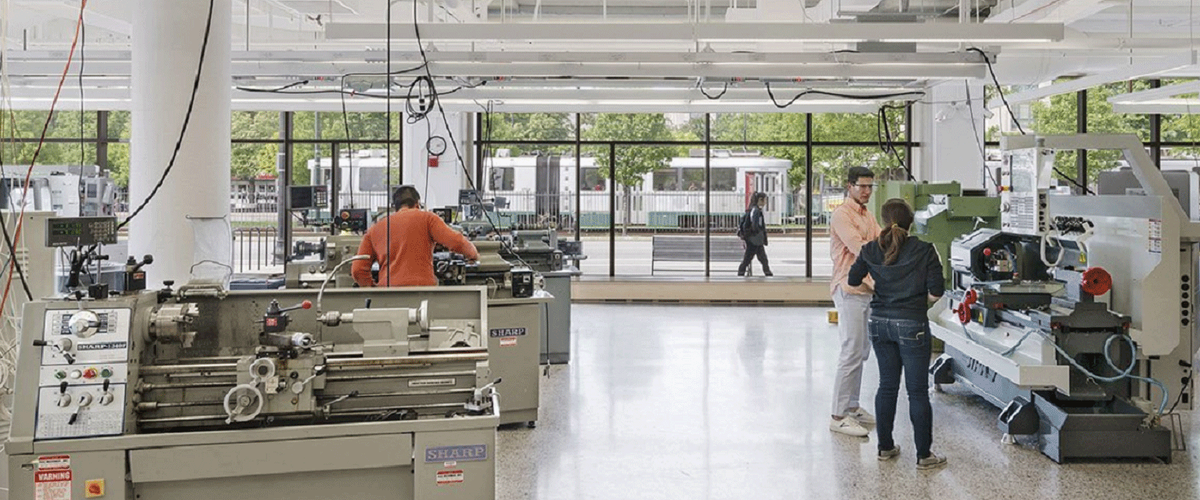Concentration in Manufacturing Engineering
This four-course, 16-credit concentration emphasizes product design and practical topics, such as green manufacturing, materials and systems, MEMS and computer-aided design.
Degree Type
- Undergrad Concentrations
Minimum Requirements
- 3 Courses
- 12 Credits
Formats
- In-Person
Location
- On-Campus
Manufacturing engineering is a cross-cutting field that covers a broad range of engineering disciplines. The concentration in Manufacturing is designed for engineering undergraduates to obtain both a foundational degree in engineering and acquire fundamental knowledge of the manufacturing discipline. The multi-disciplinary concentration courses cover the main aspects of computer-based design, the conversion of research ideas into product development, cost control and optimization, company startups, cost proposal preparation, operating plan development and supply chain management. The required courses will provide an introduction to manufacturing, with a focus on the design, scheduling, budgeting, and building of a specific project.
The 12-credit concentration is available to all engineering students. The concentration is noted on students’ official transcripts and will prepare students for careers including green manufacturing, materials and systems, MEMS and computer-aided design.
It is recommended that students interested in pursuing a Concentration in Manufacturing Engineering declare their concentration as early as possible in their degree program in order to facilitate course planning, but in no case later than May 1 of a student’s junior year. Course requirements are found below, in addition to details regarding the required experience component.
Required Course (4 credits):
ENG ME 345 – Automation and Manufacturing Methods
Elective Course options (8 credits): Students are expected to obtain the necessary background (prerequisites or equivalents) to complete their concentration courses. Any course required (by name/course number) as part of the major (excluding Technical/Advanced/Electives) cannot be counted toward the three courses (12 cr) required to fulfill the concentration.
ENG ME 357 – Introduction to CAD and Machine Components (2 cr)
ENG ME 358 – Manufacturing Processes (2 cr)
ENG ME 420 – Supply Chain Engineering
ENG ME 507 – Process Modeling and Control
ENG ME 510 – Production Systems Analysis
ENG ME 517 – Product Development
ENG ME 518 – Product Quality
ENG ME 535 / ENG MS 535 – Green Manufacturing
ENG ME 537 – Product Realization
ENG ME 557 – Additive Manufacturing
ENG ME / MS 576 – Nanomanufacturing and Hierarchical Materials
ENG ME/MS 579 – Nano/Microelectronic Device Technology
ENG ME 584 – Manufacturing Strategy
Students who are not majoring in Mechanical Engineering are strongly encouraged to take ENG ME 357 and ENG ME 358 as four credits of their elective courses.
Experiential component:
The experiential component required for the Manufacturing Concentration is intended to exercise and apply learnings from Manufacturing curriculum and is ideally performed after completing the 4-course sequence specified above. Students must complete either ME 345 or ME 420 to be eligible to undertake an approved experience. Options for experiences include senior design, laboratory research, internships, directed study, experiential courses, and others by approval.
This requirement must be approved by the Concentration Coordinator and the Experiential Component Approval form must be submitted to the Undergraduate Records Office. After its completion, a written summary of the experiential component must also be submitted for approval (see Experiential Component Summary Approval form for more information).
Resources
Declaration
Experiential Component Proposal
Experiential Component Summary
Experiential Component Instructions
SARA Complaint Process
Contact
Undergraduate Programs & Records Office: 617-353-6447 or engrec@bu.edu
Concentration Coordinator: Prof. Jim Perkins (perkins@bu.edu)
